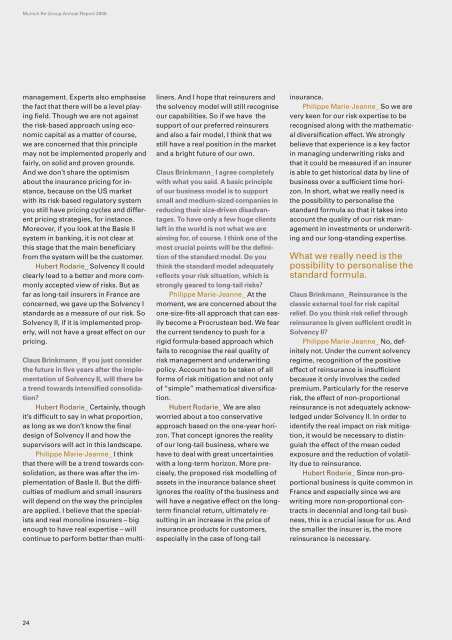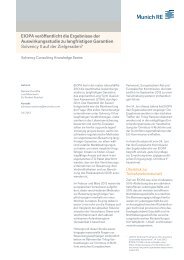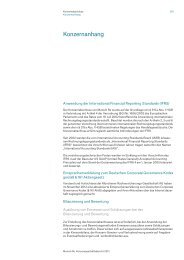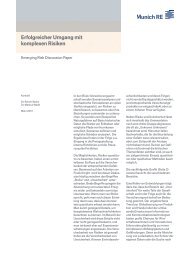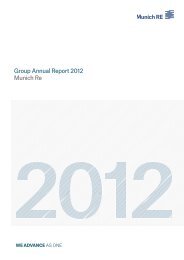Munich Re Group Annual Report 2006 (PDF, 1.8
Munich Re Group Annual Report 2006 (PDF, 1.8
Munich Re Group Annual Report 2006 (PDF, 1.8
You also want an ePaper? Increase the reach of your titles
YUMPU automatically turns print PDFs into web optimized ePapers that Google loves.
<strong>Munich</strong> <strong>Re</strong> <strong>Group</strong> <strong>Annual</strong> <strong>Re</strong>port <strong>2006</strong><br />
management. Experts also emphasise<br />
the fact that there will be a level playing<br />
field. Though we are not against<br />
the risk-based approach using economic<br />
capital as a matter of course,<br />
we are concerned that this principle<br />
may not be implemented properly and<br />
fairly, on solid and proven grounds.<br />
And we don’t share the optimism<br />
about the insurance pricing for instance,<br />
because on the US market<br />
with its risk-based regulatory system<br />
you still have pricing cycles and different<br />
pricing strategies, for instance.<br />
Moreover, if you look at the Basle II<br />
system in banking, it is not clear at<br />
this stage that the main beneficiary<br />
from the system will be the customer.<br />
Hubert Rodarie_ Solvency II could<br />
clearly lead to a better and more commonly<br />
accepted view of risks. But as<br />
far as long-tail insurers in France are<br />
concerned, we gave up the Solvency I<br />
standards as a measure of our risk. So<br />
Solvency II, if it is implemented properly,<br />
will not have a great effect on our<br />
pricing.<br />
Claus Brinkmann_ If you just consider<br />
the future in five years after the implementation<br />
of Solvency II, will there be<br />
a trend towards intensified consolidation?<br />
Hubert Rodarie_ Certainly, though<br />
it’s difficult to say in what proportion,<br />
as long as we don’t know the final<br />
design of Solvency II and how the<br />
supervisors will act in this landscape.<br />
Philippe Marie-Jeanne_ I think<br />
that there will be a trend towards consolidation,<br />
as there was after the implementation<br />
of Basle II. But the difficulties<br />
of medium and small insurers<br />
will depend on the way the principles<br />
are applied. I believe that the specialists<br />
and real monoline insurers – big<br />
enough to have real expertise – will<br />
continue to perform better than multi-<br />
24<br />
liners. And I hope that reinsurers and<br />
the solvency model will still recognise<br />
our capabilities. So if we have the<br />
support of our preferred reinsurers<br />
and also a fair model, I think that we<br />
still have a real position in the market<br />
and a bright future of our own.<br />
Claus Brinkmann_ I agree completely<br />
with what you said. A basic principle<br />
of our business model is to support<br />
small and medium-sized companies in<br />
reducing their size-driven disadvantages.<br />
To have only a few huge clients<br />
left in the world is not what we are<br />
aiming for, of course. I think one of the<br />
most crucial points will be the definition<br />
of the standard model. Do you<br />
think the standard model adequately<br />
reflects your risk situation, which is<br />
strongly geared to long-tail risks?<br />
Philippe Marie-Jeanne_ At the<br />
moment, we are concerned about the<br />
one-size-fits-all approach that can easily<br />
become a Procrustean bed. We fear<br />
the current tendency to push for a<br />
rigid formula-based approach which<br />
fails to recognise the real quality of<br />
risk management and underwriting<br />
policy. Account has to be taken of all<br />
forms of risk mitigation and not only<br />
of “simple” mathematical diversification.<br />
Hubert Rodarie_ We are also<br />
worried about a too conservative<br />
approach based on the one-year horizon.<br />
That concept ignores the reality<br />
of our long-tail business, where we<br />
have to deal with great uncertainties<br />
with a long-term horizon. More precisely,<br />
the proposed risk modelling of<br />
assets in the insurance balance sheet<br />
ignores the reality of the business and<br />
will have a negative effect on the longterm<br />
financial return, ultimately resulting<br />
in an increase in the price of<br />
insurance products for customers,<br />
especially in the case of long-tail<br />
insurance.<br />
Philippe Marie-Jeanne_ So we are<br />
very keen for our risk expertise to be<br />
recognised along with the mathematical<br />
diversification effect. We strongly<br />
believe that experience is a key factor<br />
in managing underwriting risks and<br />
that it could be measured if an insurer<br />
is able to get historical data by line of<br />
business over a sufficient time horizon.<br />
In short, what we really need is<br />
the possibility to personalise the<br />
standard formula so that it takes into<br />
account the quality of our risk management<br />
in investments or underwriting<br />
and our long-standing expertise.<br />
What we really need is the<br />
possibility to personalise the<br />
standard formula.<br />
Claus Brinkmann_ <strong>Re</strong>insurance is the<br />
classic external tool for risk capital<br />
relief. Do you think risk relief through<br />
reinsurance is given sufficient credit in<br />
Solvency II?<br />
Philippe Marie-Jeanne_ No, definitely<br />
not. Under the current solvency<br />
regime, recognition of the positive<br />
effect of reinsurance is insufficient<br />
because it only involves the ceded<br />
premium. Particularly for the reserve<br />
risk, the effect of non-proportional<br />
reinsurance is not adequately acknowledged<br />
under Solvency II. In order to<br />
identify the real impact on risk mitigation,<br />
it would be necessary to distinguish<br />
the effect of the mean ceded<br />
exposure and the reduction of volatility<br />
due to reinsurance.<br />
Hubert Rodarie_ Since non-proportional<br />
business is quite common in<br />
France and especially since we are<br />
writing more non-proportional contracts<br />
in decennial and long-tail business,<br />
this is a crucial issue for us. And<br />
the smaller the insurer is, the more<br />
reinsurance is necessary.


